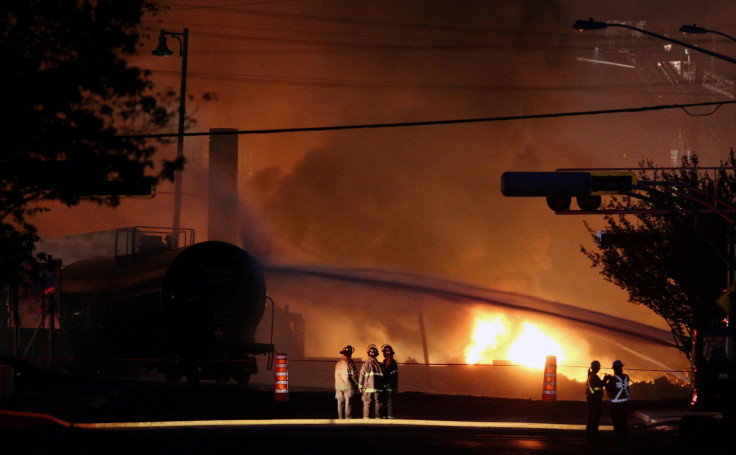Criminal Investigation Launched Into Fire That May Have Caused Deadly Lac-Megantic, Quebec, Train Explosion

Canadian police are pursuing a criminal investigation into a small fire that may have played a role in Saturday’s disastrous Quebec train explosion, they announced Tuesday.
Two more bodies were recovered, bringing the confirmed death toll to 15, and dozens remain missing.
The driverless oil tanker derailed in Lac-Mégantic around 1 a.m. Saturday morning and exploded, killing at least 15 people and destroying dozens of buildings in the center of the town near the Maine border. Fires blazed at the scene of the crash for well over 24 hours, hampering efforts to rescue possible survivors. Investigators at the scene found that the train’s air breaks had failed, leading the train to rush downhill before derailing and exploding in downtown Lac-Mégantic.
Now, the BBC reports that Canadian police have determined that a small fire aboard the train may have led to its brake failure and ultimate explosion. Police are looking into that fire as a possible criminal act.
Based on the train’s black box information and eyewitness interviews, the Canadian Transportation Safety Board has assembled a timeline of the night. Around 11 p.m. Friday, the train’s engineer and crew brought the train into its destination for the night at nearby Nantes, Quebec, and locked the train in place on an uphill slope. About 50 minutes later, a small fire started on one of the train’s locomotives, and the fire department appeared shortly thereafter to extinguish it.
Then, around 12:50 a.m., the brakes apparently failed, sending the train on a high-speed, 18-minute journey downhill. After picking up considerable speed, the train derailed inside Lac-Mégantic’s city center, and the 72 cars of crude oil inside the train exploded, killing at least 15 people and leaving as many as 50 more missing.
At the moment, police are unsure of how the fire was started or whether or not it was started intentionally. It is also unclear what, if any, role the fire played in the brake failure.
Initially, responders reported that one, then three and then five people had died in the crash while 40 were missing. Because of the high levels of destruction in Lac-Mégantic’s downtown center, police are not optimistic that many of the missing people will be found alive.
Following the crash and its resulting explosion, more than 2,000 people were evacuated from Lac-Mégantic, a town of about 6,000 residents located about 155 miles east of Montreal and 10 miles west of Canada’s border with Maine.
© Copyright IBTimes 2024. All rights reserved.











